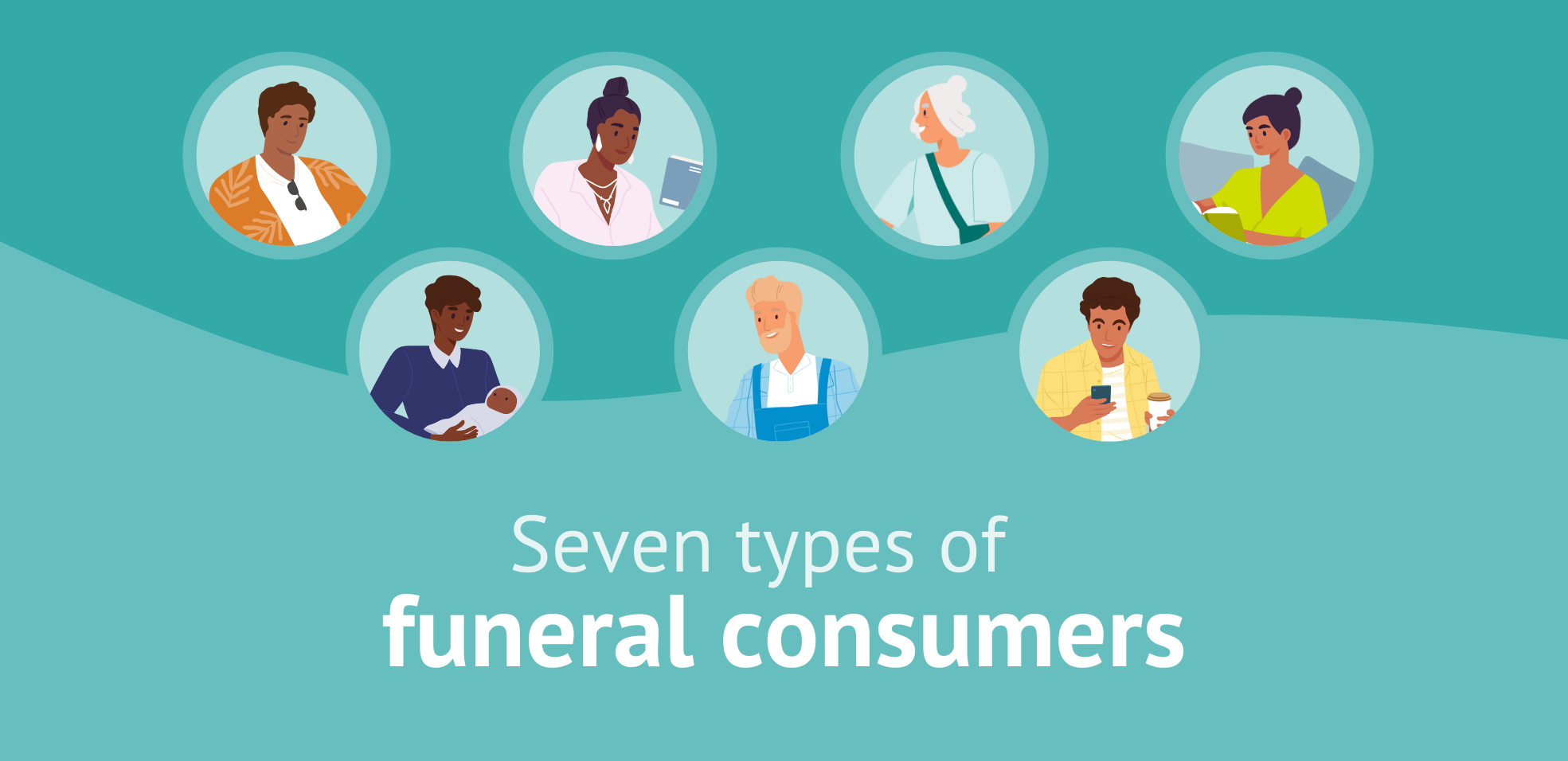3 ways funeral directors respond to change
January 02, 2023
Which one are you?
The pandemic changed funerals.
Suddenly, families were forced to limit the number of people attending the funeral of their loved one. Many people were under certain travel restrictions. Funeral home staff were getting sick while trying to serve families. And to top it off, funeral directors had to think outside of the box to help families grieve, especially since there wasn’t a way for guests to attend virtually unless a funeral home had live streaming.
These challenges caused funeral directors everywhere to have to begin adopting technology to meet the needs of families. They tried DIY livestreaming and started using software, electronic signatures, video conferencing, and more.
Some funeral homes thrived during the pandemic, but a majority of them were in survival mode.
This situation revealed something else, too: how people respond to change.
Most people respond in 1 of 3 ways: by ignoring it, reacting to it, or preparing for it.
We’ll dive deeper below.
The technology paradox
Though the pandemic was an extreme example, the fact is that change is occurring every day in funeral homes.
Families are more digital than ever, and they expect to get more done online, including funeral planning. You need to be able to keep up with their needs.
That’s why software companies, including Passare, have ways for families to preplan, sign documents, and write their obituaries entirely online.
So, your funeral home just needs more technology, right? While that might help, the problem goes deeper than that.
It’s not just about technology; it’s about the mindset.
We’ve all realized the world is changing, but maybe you’re not quite sure of the exact changes that have taken place in your community. Even if you have a pretty good idea of how your families have changed, changing the way you approach problems can help you have a solution before problems ever occur. You can do this by having the right mindset.
/Innovative%20Mindset%20Illustrations/tuning-out.png?width=408&height=305&name=tuning-out.png)
The ignorant mindset
Using the word ‘ignorant’ to describe this mindset isn’t the most positive affirmation, but it’s the most accurate way of saying people with this mindset ignore the problem. Take a look at an example of a successful company that once failed to succeed because it ignored changes taking place around them.
Kodak, the once-mighty film giant, developed the technology for the first digital camera but didn’t release one for 20 years. Steve Sassoon was the Kodak engineer who developed the prototype. When he presented the idea to the board, they said, “That’s cute - but don’t tell anyone about it.”
Kodak went on to get over 1,000 patents for their digital technology but never used them. Why? Because they made a lot of money selling film and wanted to keep it that way. The board could see change coming (people wanting digital photos), but instead of embracing it, they fought against it. You might even say they ignored it.
They wanted to do what they had always done: sell film. And we know how that turned out.
Having an ignorant mindset doesn’t mean you act out of stupidity or foolishness, but more so that you ignore the changes happening around you. Funeral homes with an ignorant mindset put their needs first, and ignore the needs of their families.
I’m sure you’re thinking ‘I would never do that’, and we would hope not. But in reality, an ignorant mindset puts their method over their mission. For Kodak, while we don’t know their exact mission, we could guess that it had something to do with capturing memories. Which does that better: film or digital? Film can break down, be destroyed, or even be lost. Digital, as long as it’s backed up, is timeless. So, why did Kodak refuse to embrace digital photography? Their methods (selling film) became more important than their mission (helping customers capture memories).
If you hold tightly to your old processes and refuse to do anything different, you’ll likely miss an opportunity to meet families where they’re at - damaging chances of relationships.
/Innovative%20Mindset%20Illustrations/chaos.png?width=504&height=365&name=chaos.png)
The idle mindset
How do you react when you see a good deal on a large ticket item like a flat-screen TV? If you’re like most consumers, you’d be pretty quick to click on a link or run to the mall to get a great deal on an item you’ve had your eye on.
However, any decision made, if not given enough time to think through it, may not lead to the best result. Think about it - reacting without thinking usually doesn’t end well for TV purchases or your funeral business.
For example, when the pandemic hit in 2020, funeral directors found themselves with no way to connect with families. They had to frantically search for solutions to continue providing service to their families. What hadn’t been a problem before left many scrambling to catch up. It’s not that funeral homes didn’t have the ability to adopt new technology; they just didn’t think they’d need it to connect with their families. They had to react in the moment, rather than having well-thought-out solutions to provide to families.
Funeral homes with an idle mindset wait until it’s absolutely necessary to change to meet oncoming needs. They’re doing what’s always worked, and so they just assume it’s the best way to meet the needs of families. To put it into perspective, think about the arrangement conference, a process you may not have updated in your funeral home in 15+ years.
Whether it’s the year 2002 or 2022, the process hasn’t changed. You might say, “Well, my method works, and I haven’t had any family complaints.” While that might be true, you shouldn’t have to hear complaints to know your families have changed or want a better process.
If you’re constantly waiting until the last minute to change, then you’re having to react instead of carefully plan out how you might react to changes coming. Having a proactive mindset, rather than a reactive one, will help you come up with the best solutions.
/Innovative%20Mindset%20Illustrations/mountain.png?width=480&height=404&name=mountain.png)
The innovative mindset
To anticipate your family’s needs and have solutions ready, you have to approach change with a proactive and innovative mindset. Take a look at how one funeral home in Albuquerque, NM, did this:
Sunset Memorial Park wanted to create more brand awareness and draw people to their cemetery. The challenge was, how would they get people to come to a cemetery with no one to bury?
They teamed up with brand agency McKee Wallwork + Co. to find a unique solution. While researching, they found that 1 in 5 families had cremated remains in their home they had never scattered or placed anywhere. They could have easily created marketing materials and campaigns to sell more urns. But, instead, they approached the problem with a different mindset. They wanted to offer something more interactive and beneficial for families, so they created an event called Scatter Day. Sunset Memorial Park opens its cemetery to the public and allows anyone to scatter their family’s ashes there. They now attract over 1,000 people a year.
Because of their mindset, Sunset Memorial had a huge impact on their community and the families that were given a chance to grieve and give their loved ones a final resting place. Funeral homes, like Sunset Memorial Park, with an innovative mindset, are not trying to fight change. They’re looking for ways to change. Even if things are working, they’re constantly asking, “Yes, but how could it be better?”
Now you know about the 3 different mindsets, and hopefully you’ve been able to identify with one or more of the mindsets. Now it’s time to take the first steps toward having a more innovative mindset in your funeral home. You, your staff, and your families will be better for it.
Discover more ways to be innovative in our full eBook, The Innovative Mindset: A New Way to Think About Change, here.
/Innovative%20Mindset%20Illustrations/new-mindset.png?width=420&height=392&name=new-mindset.png)
Diving Deeper: Identifying your mindset and making a change
Let go of your method and focus on your mission
You may be thinking, ‘The next owner will deal with these changes’, or ‘I’m about to sell or retire, I don’t need to make big changes.' But in reality, the next generation of funeral service needs you now regardless of whether you’re about to retire or not. Those of you who have been doing this for 20+ years have wisdom, dos and don’ts, and good advice. Help the next generation bring about much-needed changes within the profession.
Don’t assume that the method you’re using today, will work tomorrow
Many funeral homes are getting by using outdated equipment and technology. It may be working right now, but what happens when your computer crashes and you can’t get your files back? What happens when a family request is outside of your norm? Today’s families have already changed and continue to do so. The goal is not to keep up or even stay ahead, but to anticipate the family’s needs before they even know they need them.
Trying is key
So much has happened over the last few years that it can feel like anything more than “treading water” is a miracle. For the innovative funeral homes we’ve talked to, change is just a part of the process, and their staff are used to moving quickly. Being proactive doesn’t mean you’ll get it right every time, but it does mean you’re trying. Anticipating families’ needs will prepare you for anything, even changes you didn’t see coming.
How innovative is your funeral home?
Do you constantly look ahead to see what the next trend might be, or do you change when you absolutely have to? Do you push the limits to meet the needs of each family that walks through your door, or do you have your methods and stick to them?
Be on the cutting-edge with Passare
If you’re looking for business tools that can help you be prepared for change, you need to see Passare. Request a demo below!








